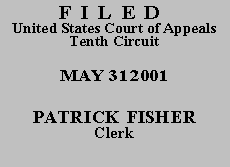

|
TERRY LA DONE LEE, Petitioner-Appellant, v. JAMES L. SAFFLE, Warden, Respondent-Appellee. |
|
Before HENRY, BRISCOE, and
MURPHY, Circuit Judges.
After examining the briefs and appellate record, this panel has determined unanimously that oral argument would not materially assist the determination of this appeal. See Fed. R. App. P. 34(a)(2); 10th Cir. R. 34.1(G). The case is therefore ordered submitted without oral argument.
This case is before the court on Terry Lee's request for a certificate of appealability ("COA") and request for permission to proceed on appeal in forma pauperis. Upon consideration of Lee's affidavit of impecuniosity, this court grants his request to proceed in forma pauperis. See 28 U.S.C. § 1915. Lee seeks a COA so that he can appeal the district court's dismissal of his 28 U.S.C. § 2254 habeas corpus petition. See id. § 2253(c)(1)(A) (providing that no appeal may be taken from a final order denying habeas relief where the detention complained of arises out of process issued by a state court unless the petitioner first obtains a COA).
To be entitled to a COA, Lee must make "a substantial showing of the denial of a constitutional right." Id. § 2253(c)(2). The district court referred Lee's petition to a magistrate judge for initial proceedings pursuant to 28 U.S.C. § 636(b)(1)(B). In a thorough and well-stated report and recommendation, the magistrate judge recommended that Lee's habeas petition be dismissed as untimely pursuant to 28 U.S.C. § 2244(d). In particular, the magistrate judge rejected Lee's assertion that his petition was timely because it was filed within one year of the Supreme Court's decision in Roe v. Flores-Ortega, 528 U.S. 470 (2000). The magistrate judge noted that Flores-Ortega did not recognize a new right to the aid of counsel in perfecting a direct appeal. Instead, the case simply held that a claim that counsel was ineffective in failing to prefect an appeal must be analyzed under the well-established rubric set forth in Strickland v. Washington, 466 U.S. 668 (1984). In so doing, the Supreme Court rejected the Ninth Circuit's bright-line rule that an attorney's failure to file a notice of appeal was per se ineffective assistance absent affirmative consent of the defendant. See Flores-Ortega, 528 U.S. at 475-78. Because Flores-Ortega did not set forth a new right, the magistrate judge concluded that Lee was not entitled to the benefit of § 2244(d)(1)(C). Upon de novo review, the district court adopted the magistrate judge's report and recommendation and dismissed Lee's petition as untimely.
As noted above, to demonstrate his entitlement to a COA, Lee must make a substantial showing of the denial of a constitutional right. See 28 U.S.C. § 2253(c). He may make this showing by demonstrating the issues raised are debatable among jurists, a court could resolve the issues differently, or that the questions presented deserve further proceedings. See Slack v. McDaniel, 529 U.S. 473, 483-84 (2000). After reviewing Lee's appellate filings and the entire record in this case, this court has nothing to add to the thorough analysis set out in the magistrate judge's report and recommendation dated October 5, 2000, and the district court's order dated January 5, 2001. Accordingly, we deny Lee's request
for a COA for substantially those reasons set forth by the magistrate judge and district court and dismiss this appeal.
ENTERED FOR THE COURT
Michael R. Murphy
Circuit Judge
*. This order and judgment is not binding precedent, except under the doctrines of law of the case, res judicata and collateral estoppel. The court generally disfavors the citation of orders and judgments; nevertheless, an order and judgment may be cited under the terms and conditions of 10th Cir. R. 36.3.